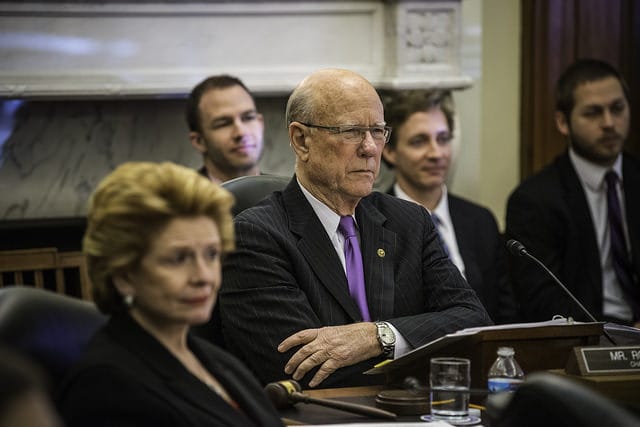Food & Environment Reporting Network
by
 |
Source: USDA |
To win Senate passage of his bill to pre-empt state GMO food-labeling laws, Agriculture Committee chairman Pat Roberts says he’ll need 60 votes — enough to quash a filibuster — and that means recruiting a substantial number of Democratic votes.
“You have to have 60,” said Roberts, who said he was seeking consensus on GMO legislation. There was no compromise, however, when the Agriculture Committee approved the Roberts bill, 14-6, without amendment.
Sen. Debbie Stabenow of Michigan, the senior Democrat on the committee, said for a bill to succeed in the Senate, “we have to show consumers there will be a mandatory disclosure” of ingredients. Democratic senators overwhelmingly support the consumer’s right to know, she said.
All 11 Republicans on the committee voted for the pre-emption bill, including Senate Majority Leader Mitch McConnell by proxy, as did three of the nine Democrats.
Two of the cross-over Democrats, Amy Klobuchar of Minnesota and Joe Donnelly of Indiana, called for national disclosure requirements. The Roberts bill would put USDA in charge of voluntary labeling of foods as GMO or non-GMO. “I expect we’re going to make some changes to the bill or it’s not going to pass on the Senate floor,” said Klobuchar. The third Democrat to vote for the bill, Heidi Heitkamp of North Dakota, said pre-emption “is a tough sell” and was skeptical that voluntary labeling would be sufficient. All three said they wanted to avoid harm to the agricultural sector.
“The leader [McConnell] wants to move a bill,” said Roberts, who said he was encouraged by bipartisan backing on his committee. Roberts said it was not clear if all 54 GOP senators would support his bill, so he would need more than six Democratic votes. While Stabenow insisted on mandatory disclosure, farm and food industry groups oppose it stoutly. “It’s difficult to get to consensus on this,” said Roberts. It is rare for Roberts and Stabenow to be on opposite sides of a bill.
“Everything is on the table” when it comes to mandatory national disclosure, said Stabenow. Asked if that included use of QR codes or explicit wording on packages, she replied, “I won’t go into details.” Agri-Pulse said Donnelly has drafted a proposal for mandatory disclosure unless 85 percent of food products are covered by voluntary disclosure. Agriculture Secretary Tom Vilsack has backed QR codes, which can be scanned by smartphones, as a way to deliver GMO information digitally.
The food industry has launched a SmartLabel initiative that uses QR codes, the Internet and toll-free numbers to provide information on GMOs and other food ingredients.
“Vermont and other states must be allowed to label GMO,” tweeted Vermont Sen. Bernie Sanders, who is running for the Democratic presidential nomination. “Parents have a right to know what they’re feeding their kids.” California Sen. Barbara Boxer, sponsor of a GMO-labeling bill, said in a tweet, “The sham #GMO bill will deny Americans the right to know what they feed their families.”
Vermont’s first-in-the-nation GMO labeling law takes effect July 1. The food industry is pressing for quick congressional action to avert what it says will be millions of dollars in costs to segregate raw materials, re-label packages and revamp distribution routes.
“I think it [the Roberts bill] is a solution in search of a problem,” said Vermont Sen. Patrick Leahy, a member of the Agriculture Committee. Vermont allows six months, to January 2017, for compliance, so there is no reason to trample states’ rights, said Leahy.
“We have to move,” said Roberts, who said it was imperative to obviate the possibility of a patchwork of GMO labeling laws. In his opening statement, the chairman echoed the unyielding view of agribusiness and food processors that the pro-labeling campaign was trying to derail U.S. agriculture and potentially the global food supply. “Any threat to the technology hurts the entire value chain, from farmer to consumer,” said Roberts.
“The attack on GMO technology is the most blatant anti-science of this age, but it is far worse than that,” said Purdue University president Mitch Daniels at a farm conference last week. “Lives are at stake and while scientists, regulators and business people are naturally reluctant to fight back, it’s morally irresponsible not to.”
U.S. farmers avidly embraced GMO seeds, which were introduced two decades ago. Half of U.S. cropland is planted with GMO seeds, mostly corn and soybeans, but also cotton, canola, sugar beets, alfalfa, sweet corn, squash and papaya. GMO varieties of potatoes and apples also have been approved by USDA.
Because most of U.S. corn, soybeans and sugar beets are GMO, the great majority of processed food in grocery stores contains GMOs.
The food industry called for swift passage of the Senate bill. The House passed a pre-emption bill last summer by a landslide margin. The FDA reiterated its policy of voluntary disclosure last fall on the same day it approved sale of a GE salmon. Roberts said he believed President Obama would sign his pre-emption bill.


 Follow Us
Follow Us Like Us
Like Us